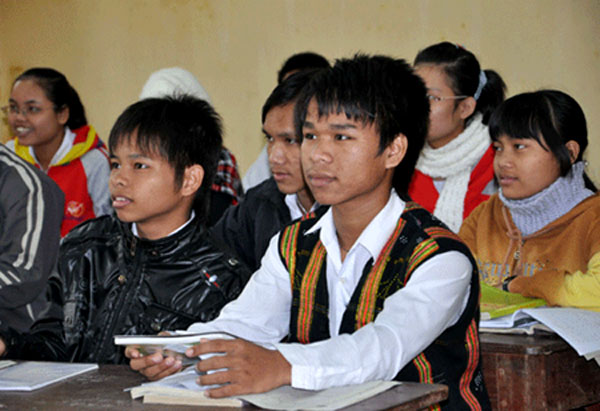
However, local authorities are reluctant to hire these students (called sinh vien cu tuyen or "nomination-based students"), complaining that they lack the necessary qualifications.
The number of nomination-based students is determined each year by the number of officials needed at local authorities. In Quang Ngai Province, there are now 208 students studying at universities and colleges under the programme, according to the People's Council.
Since 2008, the Ministry of Education and Training has allowed Quang Ngai to name 446 nomination-based students, 80 per cent of whom went to university. So far, the province has named 427 students, but it has only employed 166.
Quang Ngai Education and Training Department director Doan Dung said that the rest of the nomination-based graduates were unemployed because they lacked the necessary qualifications. For example, some nomination-based students teaching math at mountainous schools were unable to solve simple exercises.
 |
|
Vice Chairman of Quang Nam Province People's Committee Nguyen Chin said that the province would temporarily stop naming nomination-based students this year due to the many problems with the programme. — Photo baoquangnam |
Nguyen Van Thuan, chairman of Minh Long District People's Committee, complained that the policy required local authorities to employ nomination-based graduates even though they were often unqualified for the job. It was unfair to prioritise them over more talented ethnic minority students, he said.
Le Quang Thich, Vice Chairman of Quang Ngai Province People's Committee, said that the province planned to improve the quality of nomination-based students and revise the number of future students depending on the shortage of officials in order to avoid having a surplus of nomination-based graduates.
From 1999 to 2009, Thua Thien-Hue Province sent 135 ethnic minority students to universities, colleges and vocational schools. All of them have graduated, but 34 are still unemployed. They include 12 medical school graduates, nine pedagogical school graduates and 13 from other universities.
Cao Dang Ngoc Phuong, head of the Vocational Training Division under the Thua Thien-Hue Education and Training Department, said that the district had not employed all the students because they did not acknowledge the policy. Moreover, the students lacked both knowledge and practical skills.
Thua Thien-Hue People's Committee recently asked all province and district authorities to employ the unemployed nomination-based graduates by putting them on the governmental payroll or offering them contract-based jobs.
In response to the request, the province's Health Department said it planned to employ all 12 medical graduates by February 15, while the nine pedagogical graduates would be employed by June. The 13 students who graduated from other universities would be offered contract-based jobs as soon as possible and would be put on the payroll within a few years.
All districts and the education and training department would prioritise nomination-based students until all of them had occupations.
Vice Chairman of Quang Nam Province People's Committee Nguyen Chin said that the province would temporarily stop naming nomination-based students this year due to the many problems with the programme.
Since 2007, the province had named 1,372 students and employed 264 of 408 graduates. An additional 750 were studying at universities. The number of unemployed graduates had put a burden on the province, he said.
Moreover, 15 per cent of students had quit school as they were unable to catch up with the curriculum.






- Hanoi launches pilot project to integrate electronic health records into VNeID app
- Empowering new generation of biodiversity champions in Vietnam
- Capital Law to make Hanoi major center for quality education
- Hanoi raises road safety awareness among students
- Hanoi pilots artificial intelligence in five schools
- Modern pediatric hospital opens in Hanoi
